|
Australian goverment
makes Holocaust pledge
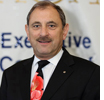 CANBERRA, July 10 - The Australian Government has pledged to promote Holocaust remembrance and look after survivors. CANBERRA, July 10 - The Australian Government has pledged to promote Holocaust remembrance and look after survivors.
Australia was represented at the Holocaust Era Assets Conference in Prague by its ambassador to the Czech Republic, Ruth Pearce. Joining her in Australia’s official delegation was Robert Goot (above, left), president of the Executive Council of Australian Jewry.
Holocaust restitution, education and remembrance were all discussed during the four-day event and Australia joined 45 other countries in signing the Terezin Declaration.
“It is most significant that Australia was represented at the conference and that it signed the Terezin Declaration,” Goot said on his return this week.
The declaration, which is not legally binding, encourages signatories to adhere to a set of regulations surrounding the welfare of Holocaust survivors, restitution, education and remembrance.
While restitution issues are less relevant in Australia, the welfare of Holocaust survivors and Holocaust remembrance are fundamental. Australia has the largest population of Holocaust survivors outside of Israel and most of them are elderly.
The Terezin Declaration encourages Australia in efforts to provide adequate social welfare for survivors noting they “have today reached an advanced age and that they have special medical and health needs”.
It also encourages Australia to “support or establish regular, annual ceremonies of remembrance and commemoration” and to include education about the Holocaust “as a matter of priority”.
“The Australian Government is committed to remembrance of the Holocaust to ensure that those events can never be repeated,” a spokesperson for Australia’s Department of Foreign Affairs and Trade said.
Goot, meanwhile, said he hopes Australia signing the Terezin Declaration will lead to more efforts on Holocaust remembrance and education.
“It is hoped that the events in Prague will, in time, provide an impetus for Australia to [join] the Task Force for International Cooperation on Holocaust Education, Remembrance, and Research and for the Shoah to be part of the mandatory history curriculum in all Australian schools,” he said.
The taskforce was established in 1998 and commits signatories to provide compulsory Holocaust education. There are currently 27 member states. Australia is not one of them.
Sharansky as Jewish Agency chairman pleases Australians
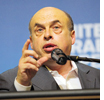 MELBOURNE, July 9- The appointment of former Russian refusenik Natan Sharansky as the new chairman of the Jewish Agency in Israel has been welcomed in Australia. MELBOURNE, July 9- The appointment of former Russian refusenik Natan Sharansky as the new chairman of the Jewish Agency in Israel has been welcomed in Australia.
Sharansky, who made aliyah in 1986 and was a former minister in the Israeli government, was unanimously elected to the position by the Jewish Agency board of governors.
Jack Smorgon, president of the United Israel Appeal (UIA) in Australia, welcomed the appointment.
Smorgon said he was yet to meet Sharansky, but was present when the new chairman accepted the position.
“I’ve heard him speak on several occasions, including the other day at the Jewish Agency, where he was elected,” Smorgon said. “He sounded very keen to get into the job and get started.”
Outgoing chairman of the board of governors Richard Pearlstone called Natan Sharansky a “true hero”.
“He is a man of deep vision and understanding of the Jewish people and, as such, he will lead the Jewish Agency forward with determination and clarity of purpose.”
Sharansky is expected to oversee the Jewish Agency’s many tasks -- from monitoring aliyah, which is dwindling, to helping Israel’s disadvantaged young people.
Smorgon said there may still be scope for Sharansky to help new migrants from the former Soviet Union.
He said the committee of the Jewish Agency, which looks after that area of the world, told the meeting there were still Jewish people languishing in the former Soviet Union, albeit not in the larger cities.
Sharansky told Ha’aretz it was the Jewish Agency’s role to build up Jewish identity in the Diaspora in an attempt to encourage aliyah.
“One of the biggest challenges is the weakening of [Jewish] identity and assimilation all over the world,” he said.
'Post-denominational' Feinman new Temple Beth Israel exec
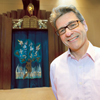 MELBOURNE, July 9— Art Feinman (at left), the recently appointed executive director of Progressive synagogue Temple Beth Israel (TBI) in Melbourne, sees no conflict between his links to Conservative shul Kehilat Nitzan and his new employer TBI. MELBOURNE, July 9— Art Feinman (at left), the recently appointed executive director of Progressive synagogue Temple Beth Israel (TBI) in Melbourne, sees no conflict between his links to Conservative shul Kehilat Nitzan and his new employer TBI.
Feinman said the “post-denominational” concept, used by TBI’s Rabbi Fred Morgan, describes a community where strict boundaries of shul identification are mellowing.
“As my wife says [of synagogue rivalry], ‘we’re over it’. To me, this isn’t a marketing exercise of poaching members from one to the other, it’s an immersion exercise, where we immerse ourselves into what the community needs and wants,” he told The AJN this week.
Feinman, an ex-New Yorker who left behind a career on Wall Street and once toyed with the idea of becoming a stand-up comic, immigrated to Australia in an unexpected way.
His Australian-born wife, Dr Gish New, returned to Melbourne to become director of cardiology at Box Hill Hospital and he joined her, landing a job in business management.
Go to the top of right column
|
|
After settling in Melbourne in 2002, the couple, who have been married for four years, went “shul shopping”, he said. They now enjoy the different flavours of the newer shtiebels that have sprung up, as well as a strong involvement with Kehilat Nitzan and TBI.
But when he accepted the position at TBI, Feinman resigned from the Kehilat Nitzan board to avoid any conflicts of interest, although he attends services regularly.
Feinman said that as TBI’s executive director, he will help implement Rabbi Morgan’s vision to continue transforming the synagogue into a versatile community centre.
“It needs to be a Beit Tefillah [house of prayer] but also a Beit Midrash [house of study] and a Beit Knesset [meeting place],” Feinman said.
TBI’s human resources, including its rabbinic team and congregation, are its greatest assets at this time of economic uncertainty, he said.
Asked how he would follow the previous executive director Alan Samuel’s 15 years in the job, he said: “No-one will ever fill Alan Samuel’s shoes.”
Shapp honored for multilingual service to the community
GLEN EIRA—The Rotary Club of Glen Eira as part of its Service to the local community has run the Business Award of the Year over the last decade, to recognise local business for service to the community.
The Business of the Year award was won by Michael Shapp of Michael Shapp Pharmacy in Glenhuntly Road Elsternwick, an area with a large and ageing Jewish population, for his first class service to the community.
Shappl has operated the pharmacy for 16 years, servicing retail clients, nursing homes and retirement facilities. His service to the multi-cultural nature of the Glen Eira community is enhanced in that he is conversant in seven languages, and has the ability to discuss the pharmaceutical requirements with clients whose command of English is sometimes limited, ensuring that he is able to provide clear and easily understandable direction for their specific health needs.
This is a service that greatly assists Jewish immigrants from the former Soviet Union, many of advanced age with considerable language shortcomings.
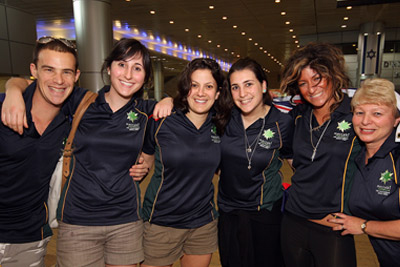
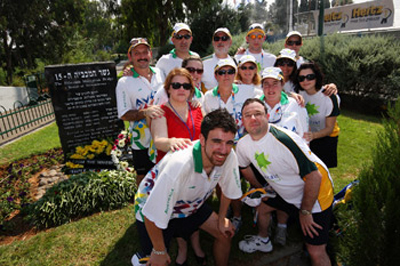
Australian Maccabians remember those who died in bridge collapse
TEL AVIV, Israel 13th July - More than 400 members of the Australian delegation to the Maccabiah Games in Israel crossed the still-poisoned waters of the Yarkon River to attend a memorial service in honour of the four athletes who lost their lives in 1997.
As the line, headed by Australia s Ambassador to Israel James Larson and NSW State MP Peter Debnam, solemnly marched across the permanent bridge eight abreast, Israeli girl guides and scouts stood by the sides handing each athlete a single flower.
A flower was laid by the ambassador at the foot of the memorial to Elizabeth Sawicki, Yetti Bennett, Greg Small and Warren Zines alongside a wreath bearing the words “from the Government and people of Australia”.
An Australian United Israel Appeal study mission joined the athletes in watching Greg Small s wife Suzanne and her children Josh and Rebecca huddle in front of the black monument now draped with the Australian flag.
As the melancholy tones of a flute wafted through the searing heat, the Smalls took their place in the front row to listen to speeches, prayers and Kaddish followed from various dignitaries including the ambassador and the president of Maccabi Australia, Harry Procel.
Larsen said: “If there is a lesson from this tragedy, surely it's the willingness of those Australians who were involved to come together and to remember those who unnecessarily died or were injured and to show a willingness to change the future.
Maccabiah management member Michelle Tremigliozzi, representing her brother-in-law whose mother, Elizabeth Sawicki, died in the 1997 tragedy, was next to speak followed by Tom Goldman, the Head of Delegation.
Goldman said: “We will never forget the passing of Greg, Yetti, Elizabeth and Warren. We continue to honour their memory by participating in the Maccabiah here in Israel, which is a true celebration of Jewish life”
As eyes welled with tears, the emotional service was next to hear from Josh Small, the 19-year-old son of victim Greg and wearing his father's team shirt from 1997.
In Israel with his mother Suzanne and sister Rebecca, Josh will compete in his late father's sport tenpin bowling.
|
|

